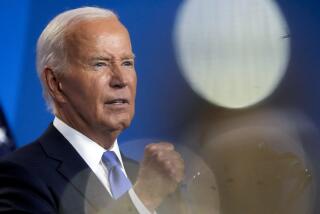Open-Primary Initiative Put on ’96 Ballot : Politics: Measure would allow Democrats and Republicans to vote for candidates outside their parties. Leaders on both sides criticize the idea.
- Share via
SACRAMENTO — An open-primary initiative designed to allow Democrats to help select Republican nominees and vice versa has qualified for the March, 1996, ballot, but spokesmen for both major political parties are criticizing the idea.
A leading proponent, Sen. Tom Campbell (R-Stanford), calls for the open primary as a political reform measure. He says it would give voters wider choices, increase voter turnout and swing more votes to middle-of-the-road candidates who represent most Californians.
Regarded as a moderate Republican, Campbell is the kind of politician who might benefit from the open primary by drawing votes from both major parties. Running only within his own party, Campbell narrowly lost the GOP nomination for U.S. senator in 1992 to conservative Bruce Herschensohn.
Another supporter of the initiative, political consultant Ron Smith, who helped qualify it for the ballot, said, “Many, many voters feel neither party represents them now, and they will be able to vote for the best person, regardless of party, under the open-primary system.” Smith served as Campbell’s U.S. Senate campaign manager.
Bob Mulholland, a campaign adviser for the state Democratic Party, replied, “Primaries are for party members to vote for their own candidates. It’s absurd to let non-members participate. I know the Lions Club doesn’t let the Kiwanis Club vote in their elections, or vice versa.”
State GOP Executive Director John Peschong called the initiative a “bad idea” and questioned whether it would result in the best possible nominees.
Under the initiative, all primary election candidates would appear on a uniform ballot provided to all registered voters. They could vote for any candidate, regardless of party affiliation.
The top vote-getters in each party represented on the ballot would appear on the November general election ballot for a final decision by the voters.
California now uses a similar system in special elections to fill state legislative vacancies.
Acting Secretary of State Tony Miller said the open-primary initiative might not survive a court challenge if it is approved by the voters.
“The courts have held that political parties have extensive control over how they conduct their business,” Miller said, “and it is unclear whether this measure would survive judicial scrutiny.
“Should this measure not be ruled invalid by the courts, the impact that this change could have on the political process is immense, although difficult to measure at this point,” he said.
A Miller spokeswoman said she did not know how many other U.S. states conduct open primaries.
More than 426,000 registered voters signed petitions to qualify the initiative for the ballot. Silicon Valley industrialist and GOP campaign contributor David Packard supplied $202,000 to help collect the names. Campbell’s own campaign committee furnished a $25,000 loan.
California’s 1996 primary election will be held in March instead of June because of a new state law that moved it up to give the state more clout in picking presidential nominees.
More to Read
Get the L.A. Times Politics newsletter
Deeply reported insights into legislation, politics and policy from Sacramento, Washington and beyond. In your inbox twice per week.
You may occasionally receive promotional content from the Los Angeles Times.










